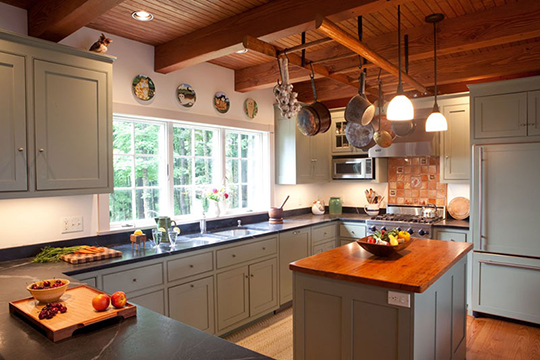Buying stock cabinets instead of custom is a good way to save substantial time and money on a kitchen remodel.
Stock cabinets save you time because you don’t have to wait for them to be built. And they save you money because you aren’t paying for customizations.
But that doesn’t mean you have to sacrifice quality. You just need to know what to look for.
What to Look For
Solid wood and plywood cabinets. They’ll give you better longevity and crisper details than pressed wood.
Walls at least ½-inch thick. They’re more sturdy.
Consistency of finish. Lesser quality cabinets often have irregular finishes and colors from one cabinet box to the next.
Full-extension hardware. It allows you to open drawers all the way and open doors almost 180 degrees to make access easier.
Dovetail joinery. Or a metal box. Drawer sides and backs that are stapled together won’t last as long.
Cost and Installation
The cost of quality stock cabinets for an average-sized kitchen generally runs $8,000 to $10,000. Semi-custom cabinets would cost about twice that. And full custom cabinets would cost even more.
There are some lower-cost stock alternatives, such as IKEA (as low as $2,500), but you’ll offset your savings with the hassle of difficult assembly — fine if you have the patience and skill.
But unless you’ve got professional building experience, actually installing kitchen cabinets isn’t a typical DIY job.
So carve out $100-$300 per cabinet (depending on labor rates in your area) to have them professionally installed.
The Drawbacks of Stock Cabinets
Finish and color choices are limited. The most likely options are painted white, natural wood, or stained maple and cherry.
Stock cabinets are only 36 inches tall. If you want taller cabinets, you’ll have to go semi-custom, which can take you up to 42 inches.
You could lose potential storage space. Filler strips are used to cover gaps created when the stock sizes don’t quite fill the space — whereas custom cabinets can be measured to take advantage of all space.
Extra details such as crown molding aren’t included. Mitered corners and furniture-style sides aren’t included either. However, you can add crown molding yourself later if you choose.
Warranties are limited. The industry standard is about 5 years, and they only cover product failure, not wear and tear.
Note: You’ll also need to choose hardware. But that can be a fun project to really personalize your kitchen.
Related: How Hard is It to Install Ikea Kitchen Cabinets?
